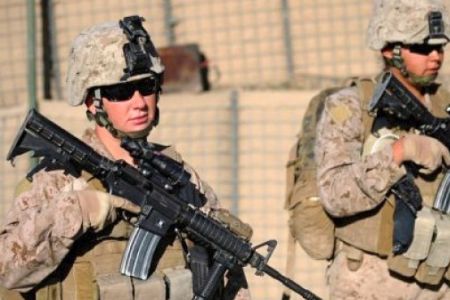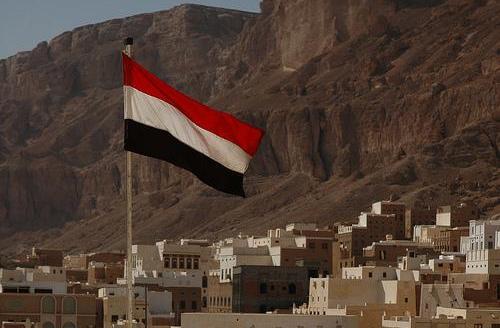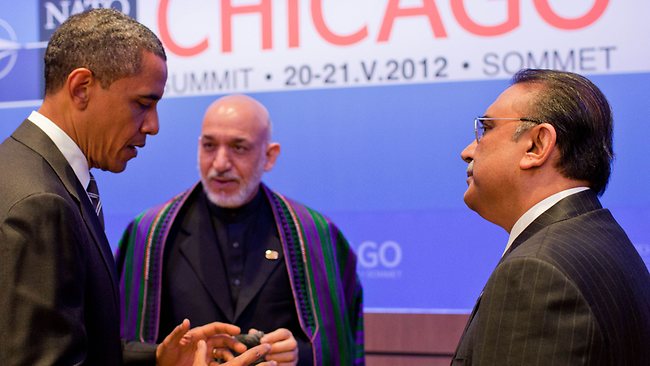[captionpix align=”left” theme=”elegant” width=”320″ imgsrc=” http://i1.tribune.com.pk/wp-content/uploads/2012/05/379625-NatoSupplyReuters-1337177390-201-640×480.jpg” captiontext=” The Salala supply route has been closed since November.”]
NATO has invited Pakistani President Asif Ali Zardari to attend the second day of the Alliance’s Summit in Chicago, focusing on the international community and its future role in Afghanistan. As the invitation is conditional on establishing dialogue between Pakistan and the US over the supply route, this invitation is the strongest signal yet that Islamabad is ready to reopen its border to US and NATO military supplies heading to Afghanistan. The tenuous relationship between the two countries has long been characterized by mistrust on both sides. Most recently relations between Pakistan, NATO and the US have been strained since Pakistani officials, in response to a NATO airstrike that killed 24 Pakistani soldiers, closed the Salala check post that served as a major NATO supply route. This closure has forced NATO to use more costly routes across Russia and Central Asia, reportedly costing the US an additional $1.5 billion since November. However, NATO’s invitation to President Zardari to attend the Chicago Summit, as well as statements from Pakistani officials, have pointed to a likely restoration of the supply route—crucial to the mission in Afghanistan.
When asked about the reopening of the supply line, Foreign Minister Hina Rabbani Khar stated “it was important to a make a point. Pakistan has made a point and now we can move on.” She also aligned Pakistan’s interests with that of NATO, another indication that Pakistan’s retaliatory closure of the post on the border is short-term. Khar affirmed that “Pakistan’s strategic objective in the region, and the stated objective of the West, or of NATO, in the region—that of peace and stability for Afghanistan—are exactly the same; they are identical.” Pakistan has a vested interest in Afghanistan because of their closely intertwined internal security situations. Pakistan cannot afford to not be a part of these discussions — something Pakistani officials, including the Prime Minister, are realizing.
Prime Minister Yousaf Raza Gilani has been outspoken about the importance of Pakistan’s relations with NATO. Islamabad is backing away from their initial refusal to lift the blockade without an unconditional American apology because they would be risking their ties not just with the US, but with over 40 countries involved in ISAF. This change in logic and tactic regarding NATO and the issue of the Salala supply line was reflected in the Prime Minister’s statement that, “We [Pakistan] want to settle the issues regarding NATO and relations with the U.S. once and for all.” Pakistan is also set to make a tidy profit off the reopening of the supply line. It is reported that Islamabad will be charging the US-led coalition approximately $1,500 to $1,800 for each truck crossing the checkpoint, totaling some $365-million a year in revenue.
President Zardari’s attendance is not surprising following the negative reaction the Pakistani Government received after its boycott of the Bonn Conference on Afghanistan in December. Pakistan’s absence from Bonn was regarded by others in the international community as a setback for efforts aimed at bringing the Taliban to the dialogue table, while attempting to bring long-term stability to Afghanistan. If Zardari decided not to go to Chicago, he risked further damage to US and NATO ties, as well as an opportunity to be part of the international discussion regarding Afghanistan after 2014.
The Chicago Summit is set to re-evaluate NATO’s strategy in Afghanistan — one that will ensure Pakistan’s role in the future of Afghanistan’s internal and external security environment. Pakistan remains vital in determining the future of Afghanistan’s stability, particularly after the withdrawal of some 130,000 NATO-led foreign forces in 2014. They are the key to bringing the Taliban to talks and preventing Afghanistan from spiralling back into chaos after the withdrawal of foreign troops.
The closing of the supply route is only further damaging Pakistan’s position and image among the NATO countries, without providing any tangible benefit. If the statements of Pakistan’s Foreign Minister and Prime Minister are any indication of what action President Zardari will take, it is very likely that Pakistan will reopen the Salala supply route.



